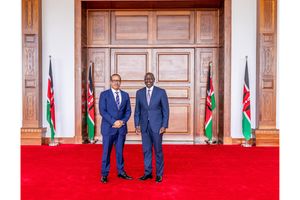Cotton, tea exports boost Tanzania-Pakistan trade

Prime Minister Kassim Majaliwa admires cotton at the warehouse of a primary Cooperative Society in Igunga, Tabora Region in July 2019. Cotton is one of major export to Pakistan. PHOTO | FILE
What you need to know:
- “The rise was largely due to increased Tanzania’s exports of raw cotton, tea and other products,” he said.
Dar es Salaam. The trade volume between Tanzania and Pakistan rose by about 44 percent in one year, thanks to a rise in the former’s cotton exports to the latter. The Pakistani High Commissioner to Tanzania, Mr Muhammad Saleem, said at the weekend that the volume rose from $107.4 million in the 2018/19 financial year to $154.8 million in the previous year.
“The rise was largely due to increased Tanzania’s exports of raw cotton, tea and other products,” he said.
Speaking at the weekend during the Pakistan-Tanzania business conference, he said Pakistan’s exports to Tanzania reached $69.8 million during the 2019/20 financial year while the South Asian nation imported goods and services valued at $85 million from the East African nation.
The conference sought to outline the way forward for partnerships and shared prosperity between key government agencies and members of the business community from both countries.
“Pakistan’s major exports included textiles, linens, tents and woven cotton fabrics among others while main imports from Tanzania include raw cotton, tea, dry fruits, cloves, hides, groundnuts, beans and others,” he said.
Tanzania also exports gold, diamonds, coffee, cashew nuts and precious metals among others while Pakistan exports textiles, agricultural machinery and equipment, fertiliser, sugar, industrial plants for cement among others.
According to Mr Saleem, Tanzania’s Dar es Salaam port also gives Pakistani businesses easy access to markets in landlocked Malawi, Zambia, Burundi, Rwanda, Uganda and Eastern DRC.
The embassy was planning to establish a bilateral business council and promote joint ventures while holding business opportunity conferences regularly and facilitating exporters for opening offices.
Tanzanians, he said, should also consider investing in Pakistan where, he said, the government was doing everything possible to improve the business environment.
Tanzania was Pakistan’s sixth top trade partner after South Africa, Kenya, Morocco, Nigeria, and Egypt.




